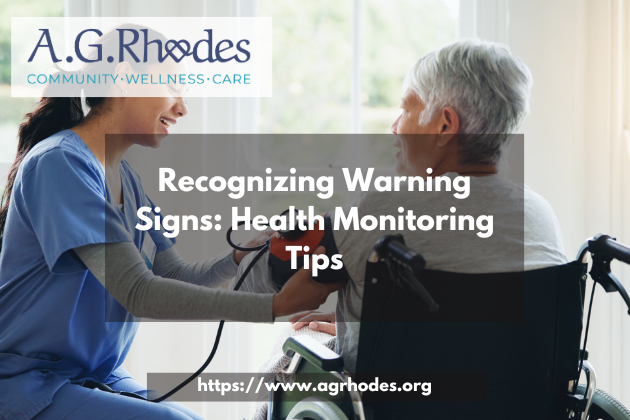 As we age, it’s essential to be proactive about our health and well-being. Recognizing early warning signs of potential health issues can help us seek timely medical attention and prevent more serious complications. In this blog post, we’ll explore some common health concerns in older adults and provide practical tips for monitoring your health.
As we age, it’s essential to be proactive about our health and well-being. Recognizing early warning signs of potential health issues can help us seek timely medical attention and prevent more serious complications. In this blog post, we’ll explore some common health concerns in older adults and provide practical tips for monitoring your health.
Common Health Concerns in Older Adults
- Cardiovascular Disease: Heart disease remains a leading cause of death among older adults. Pay attention to symptoms like chest pain, shortness of breath, irregular heartbeat, and sudden dizziness.
- Stroke: Strokes can have devastating consequences. Be aware of signs such as sudden numbness or weakness, especially on one side of the body; confusion; trouble speaking or understanding; severe headache; and sudden vision changes.
- Diabetes: High blood sugar levels can lead to various health problems. Monitor for symptoms like excessive thirst, frequent urination, fatigue, blurred vision, and slow-healing wounds.
- Arthritis: Joint pain, stiffness, and swelling are common symptoms of arthritis. If you experience persistent discomfort, consult a healthcare professional.
- Dementia: Changes in memory, thinking, and behavior can be indicative of dementia. Pay attention to symptoms like difficulty remembering recent events, trouble following conversations, and changes in personality.
- Depression: Mental health is just as important as physical health. Be aware of signs of depression, such as persistent sadness, loss of interest in activities, changes in appetite or sleep patterns, and feelings of hopelessness.
Effective Health Monitoring Tips
- Regular Check-ups: Schedule regular appointments with your healthcare provider for routine check-ups and screenings. This allows for early detection of potential health issues.
- Know Your Family History: Understanding your family’s medical history can help identify risk factors for certain diseases.
- Monitor Vital Signs: Keep track of your blood pressure, heart rate, and blood sugar levels, as appropriate. Regular monitoring can help detect any abnormalities.
- Pay Attention to Changes: Be aware of any unusual symptoms or changes in your body. If you notice something concerning, don’t hesitate to seek medical advice.
- Maintain a Healthy Lifestyle: A balanced diet, regular exercise, and adequate sleep are essential for overall health.
- Stay Informed: Keep up-to-date on the latest health information and guidelines.
- Build a Strong Support Network: Having a strong support system can help you cope with health challenges and maintain a positive outlook.
At AG Rhodes, we are committed to supporting seniors in their journey to optimal health. Join our Health Monitoring Initiative and receive personalized guidance, resources, and support to help you proactively manage your health.
Here’s how you can get involved:
- Schedule a consultation: Meet with one of our healthcare professionals to discuss your specific needs and develop a personalized health plan.
- Attend educational workshops: Learn about various health topics and gain valuable insights into healthy aging.
- Connect with other seniors: Join our community of like-minded individuals and share experiences and support.

